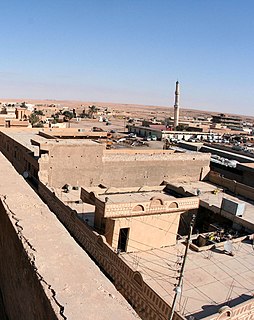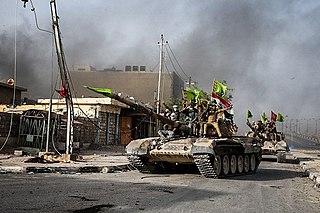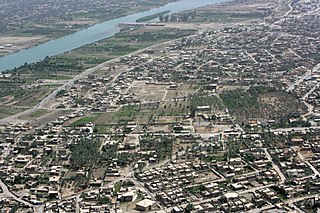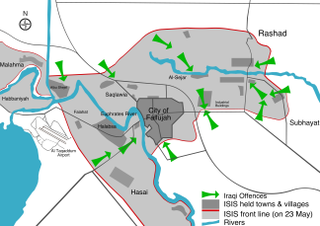
Fallujah is a city in the Iraqi province of Al Anbar, located roughly 69 kilometers (43 mi) west of Baghdad on the Euphrates. Fallujah dates from Babylonian times and was host to important Jewish academies for many centuries.

Ar-Rutbah is an Iraqi town in western Al Anbar province, completely inhabited with Sunni Muslims. The population is approximately 22,000. It occupies a strategic location on the Amman-Baghdad road, and the Mosul–Haifa oil pipeline. Considered a "wet spot", it receives 114.3 mm (4.5 inches) of rain annually, and is located on a high plateau. It has been described as "the most isolated town of any size in Iraq."

Ayn al-Asad Airbase is an Iraqi Armed Forces and United States armed forces base located in the Al Anbar Governorate of western Iraq. The base is also used by UK forces in Iraq.

Operation al-Shabah was launched in May 2013 by the Iraqi Army, with the stated aim of severing contact between the Islamic State of Iraq and the Levant and the al-Nusra Front in Syria by clearing militants from the border area with Syria and Jordan.

Beginning in December 2012, Sunnis in Iraq protested against the Maliki government. On 28 December 2013, a Sunni MP named Ahmed al-Alwani was arrested in a raid on his home in Ramadi. Alwani was a prominent supporter of the anti-government protests. This incident led to violence in Al Anbar Governorate between the Iraqi Army and a loose alliance of tribal militias and other groups fighting alongside the Islamic State in Iraq and the Levant (ISIL).

Shaker Wahib al-Fahdawi al-Dulaimi, better known as Abu Waheeb, was a leader of the militant group Islamic State in Iraq and the Levant in Anbar, Iraq. He was known for killing three Syrian truck drivers in Iraq in the summer of 2013. He and three others were killed in a United States-led coalition airstrike in May 2016, according to the US Department of Defense.

The Iraqi Civil War was an armed conflict which began in January 2014 and ended in December 2017. In 2014, the Iraqi insurgency escalated into a civil war with the conquest of Ramadi,Fallujah, Mosul, Tikrit and in the major areas of northern Iraq by the Islamic State of Iraq and the Levant. At its height, ISIL held 56,000 square kilometers of Iraqi territory, containing 4.5 million citizens. This resulted in the forced resignation of Iraqi Prime Minister Nouri al-Maliki, as well as a massive airstrike campaign by the United States and at least a dozen other countries, participation of American and Canadian troops in ground combat operations, a $3.5 billion U.S.-led program to rearm the Iraqi Security Forces, a U.S.-led training program that provided training to nearly 200,000 Iraqi soldiers and police, the participation of Iranian troops including armored and air elements, and military and logistical aid provided to Iraq by Russia. On 9 December 2017, Prime Minister Haider al-Abadi announced victory over ISIL, though others warned that they expected ISIL to fight on via an insurgency, and by other means. ISIL switched to guerrilla 'hit and run' tactics in an effort to undermine the Iraqi government's effort to eradicate them.

The Battle of Ramadi (2014–15), also called the Fall of Ramadi or Battle of Abu Muhannad Al Sweidawi , was part of an ISIL offensive to capture all of the Anbar Province. Ramadi was one of the Iraqi government's last strongholds in Anbar, after its success in a previous campaign. The battle began in October 2014, and drew to a close on 14 May 2015, as Islamic State of Iraq and the Levant (ISIL) insurgents seized hold of government buildings. On 17 May, the Iraqi Army and special forces fled the city, with 500 civilians and security personnel dead.

The Fall of Hīt was the capture of the important town of Hīt by ISIL, which cut off the road leading to nearby Haditha.

The Al-Karmah offensive (2015), named Fajr al-Karma, was an offensive launched by the Iraqi Army and anti-ISIL Sunni tribal fighters to recapture the Al-Karmah district taken by the Islamic State of Iraq and the Levant in Iraq. The offensive began on 14 April 2015. During the offensive the anti-ISIL forces captured part of the city of Al-Karmah, and the old road of Al-Karmah.
In early 2014, the jihadist group Islamic State of Iraq and the Levant captured extensive territory in Western Iraq in the Anbar campaign, while counter-offensives against it were mounted in Syria. Raqqa in Syria became its headquarters. The Wall Street Journal estimated that eight million people lived under its control in the two countries.

The Battle of Ramadi (2015–16) was a battle launched by the forces of Iraq to successfully recapture the city of Ramadi from the Islamic State of Iraq and the Levant (ISIL), which had taken the city earlier in 2015 in a previous battle. Air power was a major component of the battle, with the United States and other nations conducting over 850 airstrikes in the Ramadi area from July 2015 to late February 2016, and the US crediting airstrikes with 80% of the reason why the city was recaptured. By February 2016, Iraqi forces successfully recaptured the city after two and a half months of fighting. It was predicted that it would take several months to clear the city of the bombs ISIL left behind, with at least 9 months needed to clear the city's Tamim District. At the time, Ramadi had suffered more damage than any other city or town in Iraq. It is the 100th battle in Ramadi since 2003.

The Anbar campaign (2015–16) was a military campaign launched by the Iraqi Armed Forces and their allies aimed at recapturing areas of the Anbar Governorate held by the Islamic State of Iraq and the Levant (ISIL), including the city of Ramadi, which ISIL seized earlier in 2015. The United States and other nations are aiding Iraq with airstrikes.

The Siege of Fallujah (2016) was an offensive that the Iraqi government launched against ISIL in Al-Karmah and in the city of Fallujah, with the aim of enforcing a siege of Fallujah. During the operation, local Sunni residents revolted against ISIL for a period of 3 days, in February 2016. On 22 May, after completing preparations around the city, the Iraqi Army and supporting Shi'ite militias launched the Third Battle of Fallujah.
The Battle of Hit (2016), also known as Operation Desert Lynx, was an offensive launched by the Iraqi Government during the Anbar offensive, with the goal of recapturing the town of Hīt and the Hīt District from ISIL. After the Iraqi forces recaptured the city of Ramadi, Hīt and Fallujah were the only cities still under the control of ISIL in the Al Anbar Governorate. Iraqi Forces fully recaptured of Hīt and the rest of the Hīt District on 14 April 2016.
This is a timeline of events during the Iraqi Civil War in 2016.

The Ar-Rutbah offensive (2016) was a military offensive in Iraq launched by the Iraqi Army to recapture the strategic town of Ar-Rutbah from ISIL, along with the rest of the Ar-Rutba District.

The Western Iraq campaign was the final major military operation of the Iraqi Civil War (2014–2017), in the western province of Anbar, and on the border with Syria, with the goal of completely expelling ISIL forces from its last strongholds in Iraq.
The Western Anbar offensive was a military operation by the Iraqi Army against the Islamic State of Iraq and the Levant, in the western districts of the Province of Anbar and on the border with Syria.















